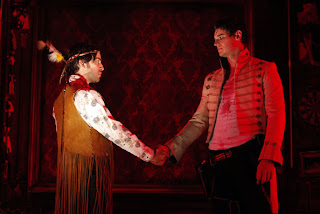

Last night, along with fellow graduates of Brown University, I was invited to a performance of the new emo/rock musical Bloody Bloody Andrew Jackson, followed by a talk with one of the show's producers, Oskar Eustis. Eustis, who looks a bit like Paul Bunyon with a beard and a mop of brown hair, is the artistic director of the Public Theater where the production of this show began its life. The genesis of the idea to put the life and political career of the 7th President of the United States to an emo/rock score apparently involved a playwright and a composer with completely different theatrical agendas: one was fascinated by a course in which he studied Andrew Jackson, and one just wanted to do something related to emo kids and their subculture. The result, as my friend pointed out, is a "reese's pieces" of a musical and it totally works.
Part of the reason it works is that it treats American politics of the 19th century with the same irreverence that South Park treats Oprah Winfrey and her private parts: nothing is sacred. Jackson, played superbly by the Julliard-trained young actor Benjamin Walker, is a gun-toting, tight jean and eye liner wearing loose canon, who throws chairs when he doesn't get what he wants and sings about how life "sucks" when his parents are killed by Indians. He also spills a lot of blood and not just when he conquers the Spaniards, the British and the Seminoles in Florida. He and his true love Rachel like to cut themselves when they are happily in love and also when they despair. The fact that the audience laughs and cringes at the same time pretty much sums up the overall tone of the show.
Walker, as Jackson, is such a commanding stage presence that he masters the appeal of America's first populist president, whose dubious claim to fame is how he solved the "Indian Problem" by forcing the Indians to keep moving further West until there was nowhere left to go (but onto reservations.) As serious as the issues are that Jackson faces when he finally becomes President in 1829 (after being robbed of the Presidency the first time around in a conspiracy of the Bush/Gore variety) the show continues to mine his political and personal relationships for their humor and resonance with contemporary political shenanigans. Jackson is the "people's president," but when he gets into office he finds that the populace doesn't know what the hell they want. And he sings "it's impossible to get anything done in Washington." That tune sounds so familiar.
It doesn't take long to get the feel for the bizarre juxtaposition of history and popular culture that is this superb production. The set designers have turned the entire Jacobs theater into a combination Victorian-Goth fun house, complete with blood red walls, a stuffed horse hanging upside down over the audience, numerous chandeliers, and at least two electric guitar players on stage at all times. The music and lyrics are loud, brash and a lot of fun. Bloody Bloody Andrew Jackson may just be the only bloody good thing in the fall theater season.




